2009-2010
2009: COLOMBIA: CTQI STANDARD FOR PORT OF CARTAGENA
CARTAGENA/COLOMBIA OCTOBER 2009
COLOMBIA: CTQI STANDARD FOR PORT OF CARTAGENA
The standard is a benchmarking tool for evaluating the quality of container terminals and to increase efficiency. CTQI certified terminals can prove to its stakeholders that they fulfil a minimum of requirements. Both terminals are operated by Sociedad Portuaria Regional de Cartagena S.A. (SPRC). CTQI was developed in 2008 by the Global Institute of Logistics (GIL), GL and other experts in international container port logistics.

“Speed, safety and efficient container terminals are more important than ever. Our certification system is supposed to help measure and document performance level and quality standards of container terminals,” explains Bernhard Ständer, Managing Director Germanischer Lloyd Certification GmbH.
The terminals are the first certified terminals in Americas. Certification according to CTQI shows that the terminal’s process organisation and performance meet the requirements and consistently high-quality services can be provided. This is proved by the audit results. “Terminal operation is structured transparently, modern technologies are implemented and well trained staff is applied, “ says Kieran Ring, CEO Global Institute of Logistics.
CTQI audits require an effective management system as well as convincing key performance indicators. Auditors assess criteria such as crane capacity and their performance data. In addition the efficiency of loading and unloading trains, trucks and inland vessels is evaluated. Also, organisational aspects such as adequate connectivity with the hinterland and the inland waterway system are audited
The Port of Cartagena lies on the northern Caribbean shores of Colombia. Under SPRC’s management, the Port has become Colombia’s largest and most important container port terminal. Throughout the implementation and certification process SPRC has been supported by Hamburg Port Consulting GmbH (HPC).
2009: VPA ENCOURAGES STAKEHOLDERS TO SHARE IN ITS SUCCESS AS BEST-IN-CLASS PORT COMMUNITY
VALENCIA SPAIN OCTOBER 2009
VALENCIA PORT AUTHORITY ENCOURAGES STAKEHOLDERS TO SHARE IN ITS SUCCESS AS BEST-IN-CLASS PORT COMMUNITY
Valencia Port Authority (VPA) has brought together its port stakeholders to share in its Global Institute of Logistics’ (GIL) Best-in-Class Port Community recognition. In excess of 120 port stakeholders gathered in the prestigious VPA conference rooms to hear GIL Chief Executive Kieran Ring explain the criteria for the Best-in-Class designation and why Valencia outshone other Port Community contenders. VPA Chairman Rafael Aznar went on to encourage the port stakeholders to take commercial advantage of this illustrious award, and to continue to work together to further forge the Spanish port’s culture of collaboration.

Among the port stakeholders present were representatives from shippers, including Mediterranean Shipping Company and Boluda; terminal operators and stevedores, including Dragados; and a number of high ranking officials from both local and regional government.
After the event, GIL’s Kieran Ring commented:
“To see the Valenciaport family of stakeholders gathered at this landmark event confirms the research that led to our designation of VPA as the best Port Community in the world. These port stakeholders are unique in that they pay more than lip service to the importance of collaboration; they understand the true worth of working together for the greater good of Valenciaport.”
Valenciaport was awarded the Best-in-Class Port Community accolade at the annual GIL European Chapter dinner in Bremen earlier this year. In recognition of the award, VPA’s Rafael Aznar was simultaneously appointed as Chairman of the European Chapter of the Institute’s Global Maritime Logistics Council (GMLC). As a working council within the Institute, the GMLC provides the global maritime logistics industry with a forum through which global shippers, 3PLs, carriers, port authorities and terminal operators can share knowledge to improve supply chain efficiency and security.
The Institute has developed a specific research and development module with Valenciaport for execution within the two year period of Mr Aznar’s appointment. This module will research global standards in port cluster governance and result in the publication of a guide to best practice Port Cluster Governance in 2011. The vision is that these best practices, once identified and agreed, are incorporated into independently auditable and certifiable international standards where it is practical to do so.

